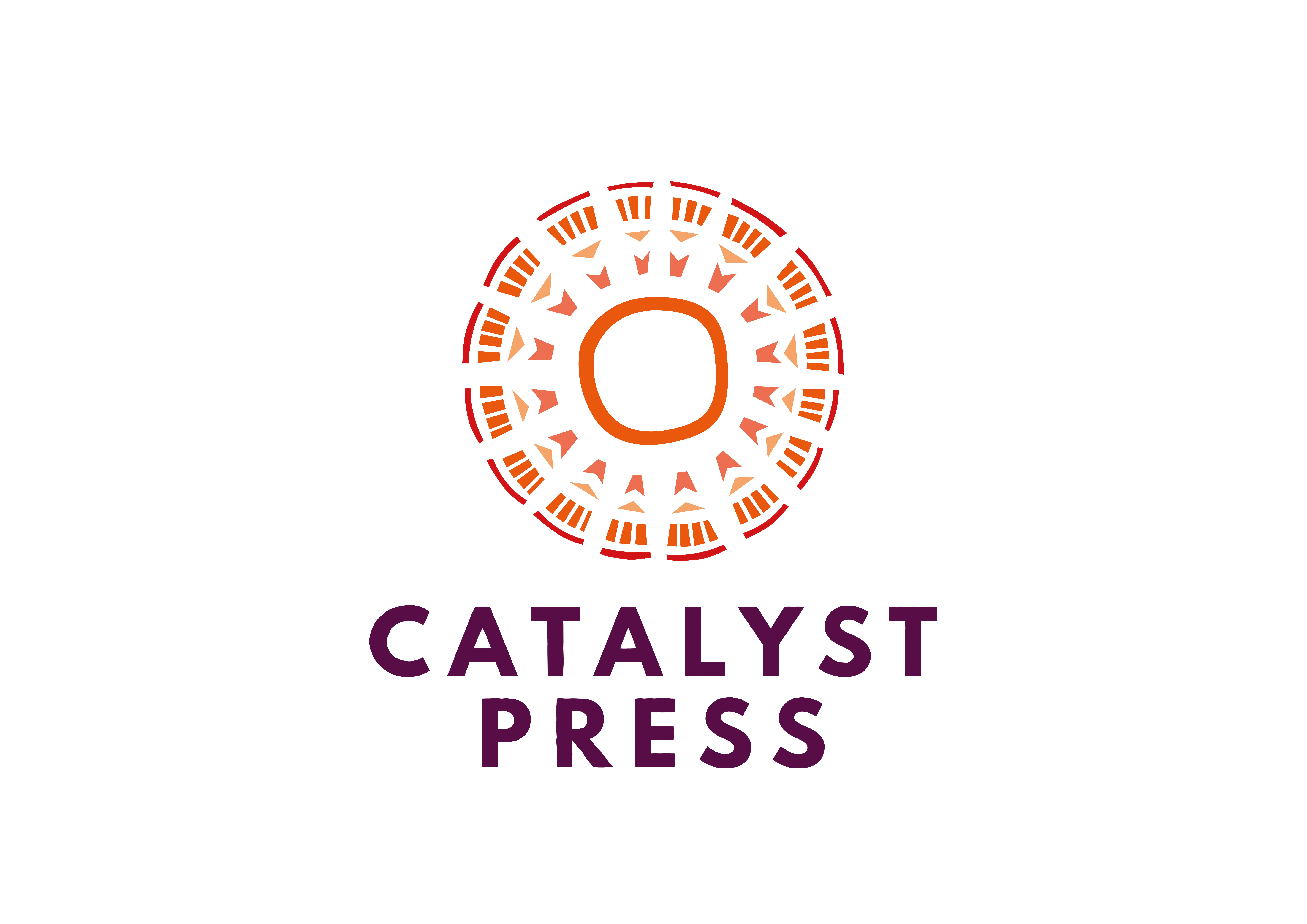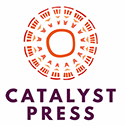Hi everyone, happy #ReadingAfrica Week 2022! As part of our week-long celebration, we have the privilege of posting this exclusive guest post from literary agents Raphaël Thierry and Emma Shercliff, a transcript of their recent conversation about all things African literature. The conversation is split into two parts—the first published below, and Part 2 to be published tomorrow!
Over the past several years, we’ve received many amazing manuscripts by African writers from both Raphaël and Emma, and it’s with great excitement that we officially introduce them to our Catalyst Press community today. We hope you enjoy this fascinating conversation between two very well-established professionals in the African publishing space, where they discuss everything from translations and authors rights, to exciting new projects and big trends in the industry (and one very special announcement!).
Let’s get started.
Emma Shercliff
Hello, Raphaël. Nice to see you.
Raphaël Thierry
Hello Emma. Nice to see you, too. How are you doing? Long time no see. I think last time we met was in Geneva, in Switzerland, right?
Emma Shercliff
Yes, many years ago, at the Salon du Livre, in a pre-COVID existence.
Raphaël Thierry
Absolutely. Which made our lives so challenging and at the same time so exciting, especially as agents. And I think that’s a key part of this discussion we are having together today thanks to Catalyst and this exciting reading project. And hopefully, we can give some good updates about our work and I’m very happy that we can share this moment together.
Emma Shercliff
Yes, it’s a great opportunity to have a chance to catch up. So I’m delighted to see you.
Raphaël Thierry
So maybe we can start with just simply presenting who we are? And so you are Emma Shercliff, the literary agent, but also Emma Shercliff, if I’m correct, a former researcher. And I would be very curious to hear more about your journey.
Emma Shercliff
Yes. I guess the potted history is that I’m a longtime publisher, and now an agent. But I’ve had these academic studies going on in the background for many years. And it’s been a source of frustration in some senses, in that I started a PhD looking at the experience of women in the African publishing industry, many years ago now. And that’s what led me to be so interested in writing from Africa and then publishing in Africa. But of course, every time I try and do my academic studies, I end up becoming much more of a practitioner than a researcher. And, for me, each feeds into the other. But now the academic studies are definitely in the background, and the agency is in the foreground, but I’m not unhappy about that. It’s just that trying to do both is really difficult. I think it’s really important to try to do both because I do get rather frustrated sometimes at academic conferences, or reading articles, which can be too theoretical and not based in the reality of publishing, particularly publishing in Africa. But then equally trying to be a practitioner and also conduct research or even write a journal article, for me is proving very difficult. I don’t know how you feel about that.
If I could help to publish more African writers that felt to me, in the longer term, more fulfilling both for myself, personally, but also maybe of more of more use to the world!
Raphaël Thierry
I will easily say that I feel the same way. I used to work also within research for about 12 years, I guess. And at some point, juggling with many hats was a bit of a pressure. And at the same time, I felt the necessity of focusing on a more concrete aspect of this interest. I had this post-colonial aspect of my research which was basically literatures produced in Africa or from writers with African origins, notably in Cameroon. And maybe, moving from research, towards literary agenting was, for me, the most meaningful way of feeling myself useful in this way of following up my career, and working with writers I admire in the world. And sometimes as a researcher, you always wonder, but for whom am I writing? And is it not sometimes a little bit too isolated from the world? Because who will read these books except academics, researchers? Or am I maybe willing to promote books and novels somehow? And I felt like this was what I am, increasingly, within me.
Emma Shercliff
Yes, that was exactly my experience. When I became involved with Cassava Republic, there was a point at which I had to decide whether I wanted to write about the publishers, or actually be a publisher, decide what was of greater contribution. And I reasoned that ultimately, if I could help to publish more African writers that felt to me, in the longer term, more fulfilling both for myself, personally, but also maybe of more of more use to the world!
Raphaël Thierry
I think we always need to need to have something strong, a basis, a grounding. It’s quite important. And I think maybe this drives us towards this idea we had at some point. And I will be very curious to know, why you have chosen this, sometimes a bit mysterious way of becoming an agent, because a literary agent is a specific position within the publishing industry, and especially a literary agent working in this global area of African literature. I’m very interested to know why.
Emma Shercliff
For me the catalyst was really clear, although I don’t think I’d ever really considered seriously becoming a literary agent until a very particular moment. So the background is that I’d worked as a publisher for over 20 years, initially with very large multinational corporate publishers, Macmillan and then Hodder, part of Hachette, in quite senior roles at both of those companies. And then I took a break, started this PhD and started a family – the two were not unconnected in that I had stepped away from corporate publishing to focus on family life for a while. And then after working on the PhD, where I was researching the role of women in the African publishing industry, I became involved with Cassava Republic initially in Nigeria and then in the UK. But after five very fulfilling years with Cassava Republic, I really felt it was it was time to take a step back from that and finish finally my research.
And then it was in the middle of lockdown when I was sitting in my office and a report landed in my inbox from a project called Common People which was looking at the lack of working-class writers in the UK. And so much of what I read in that report spoke to me and resonated with my experience selling and working with African writers in the UK through my work at Cassava Republic. And one of the calls to action in this report was that more literary agents should set up outside London. There was a clear link they were making between the lack of accessibility and the lack of opportunity for writers to interface with literary agents and having the majority of agents located within a few square miles of central London. And the report suggested ways of opening up the industry and presenting more transparent ways of agenting. And I was in my home office in Suffolk, in the East of England.
I’m equidistant here between the two counties of Norfolk and Suffolk. Norfolk is well known for the University of East Anglia, which has a very prestigious Creative Writing MA; Norwich is a UNESCO City of Literature and is home to the National Centre for Writing. And then Suffolk is a county which is home to many writers. So I thought, ‘Well, okay, it’s one of those situations where if I don’t do it, nobody else will. And if somebody else does do it, I will be really annoyed I haven’t done it.’ So I took the plunge and I set up Laxfield Literary Associates.
My initial idea was to represent authors in my geographical area in Norfolk and Suffolk. And then, of course, very quickly, I realised that if I was going to take the big decision to set up my own agency, I wanted to work with a range of authors that I felt very passionate about. And so broadly, for me that meant authors from underrepresented backgrounds, although I was careful not to state what I meant by that, but instead to present on my website the sorts of things I was looking for, and let authors decide for themselves if that spoke to them. And as it’s transpired, about half of my writers are African writers, because more established authors, with whom I’d worked in the past, started to recommend me to the younger generation coming through. And of course, now I wish I’d set up the agency earlier. I absolutely love what I’m doing now. In some ways, it feels like a bit of an accident. But of course, these things are always a combination of opportunity, and timing and luck. And, of course, all that work – both my 20 years as a publisher, but then also the research work, has informed my practice as an agent. And how about you Raphaël? Tell me your origin story…
Raphaël Thierry
Yes, but first I have to say that I’m very grateful to your work because you’re one of the very few agents from this English-speaking world who pays great attention to what happens within the Francophonie – which brings me to my origin story somehow, because I, as a researcher, used to work on the publishing challenges of the African publishing industry, and I happened to meet many, many people from this field, especially Pierre Astier, who was in 2014, in Dakar. And he introduced me at that time to this work of a literary agent. And he was one of the very few literary agents working in France at that time. And one of the very few to have this interest in the diversity of Francophonie, in terms of publishing, and in terms of international reach, and not just considering Paris as the very hotspot for African literature, which is very often the case, economically speaking, it’s still very clear that Paris is somehow dominating. But in terms of literature, diversity and quality, it’s not possible to hierarchize, and it’s not very healthy either. And carrying on this discussion with Pierre Astier for about five years, he proposed me to collaborate with his agency.
I feel like literature can be a wealthy place, somehow, and a place where writers can feel they can just be writers because they’re confident that the books are defended, and they know their rights are respected. And this notion of respect is very essential. Because when you feel as a writer respected in your rights, then you feel good at writing
So the literary agency Astier-Pecher and I collaborated together for three years. So it was from 2019 until this very year, when we ended our collaboration on very good terms, and I’m very grateful for this experience because this introduced me to some aspects of the field I was completely missing as a researcher and as a person interested about African publishing and literature, which was this: the contracts and what is just behind books. Books cannot exist without a contract, and inside the contract there are so many very essential points that are actually carrying the life of literature internationally. Territories, how long will a book be published in a certain language, how will the publisher handles these rights and what will be the visibility the writer has on his own work’s exploitation in this country, this language, or this territory. And this is fascinating, because when you are very clear on this and when you work well as an agent, I feel like literature can be a wealthy place, somehow, and a place where writers can feel they can just be writers because they’re confident that the books are defended, and they know their rights are respected. And this notion of respect is very essential. Because when you feel, as a writer, respected in your rights, then you feel good at writing, I guess. And that’s why maybe naturally at some point, I felt like this is what I’m somehow willing to do now.
And so I recently started my literary agency, which will be announced in a few days, but I can already say the name, it will be the literary agency Ægitna, in reference to a certain place in the south of France, which used to be a main city of an ancient Mediterranean civilization. This city was maybe Cannes, which is my family’s city, and Cannes is also the city of a printing press, Imprimerie Ægitna, – very communist – and the very first press to publish an anthology of Cameroonian literature, in 1962. The very first book on Cameroonian literature, the very first anthology was published in my grandparents’ street where their bakery was! So this connection made so much sense for me, I was so happy. So this is the literary agency, Ægitna, and I’m very proud to announce it.
Emma Shercliff
That’s fantastic – and congratulations on this big step. I have lots of questions to ask you! But I’ll just backtrack on one thing you’re saying about defending and protecting the rights of the author. As ever, in these conversations, I’m keen to take the opportunity to explain more about what an agent does. And I think sometimes there’s this view of an agent as being very glamorous and going to launch parties and events, but of course, much of what we do is to do with contracts. It’s massively important, because the most significant thing you can do as an agent, apart from obviously being there as a source of support for your writer, is to ensure that the contract is sound. And of course, you and I have both seen contracts from many different countries, including the UK and France, where the contracts are not sound, and it can really make incredible difficulties for authors later on. So, having robust terms – and of course, that means financially robust yes, good advance, good royalties – but it’s so much more than that. I think it’s really important to talk about that aspect of agenting, which I think sometimes gets lost. And when will you launch your agency?
Raphaël Thierry
I will communicate a bit more at the very beginning of next year. But I will announce it in a few days and the website is already almost finished. So it’s ready to start up and hopefully it will get some success. But anyway, it’s not just a matter of success. It’s a matter of being committed to the job. I really am, I really believe in it. I feel also that it’s a very interesting time and exciting time as a literary agent, because there are so many things that are happening around postcolonial literatures. And coming back to this intellectual reflection, which is another part of our jobs as a literary agent, I feel like sometimes it’s important to represent writers, because they are writers. And it might sound a bit funny saying it like that, but being interested in the African field is sometimes a bit ambiguous because then you quickly slip towards this notion of categories, and sometimes even hierarchies, which might be a bit specific and complicated to deal with. Because there is a past, there is a colonial past of course, and now, especially as Western professionals, we need to really grasp all these subtleties and to maybe take books because of their aesthetics – more than only their origin stories – as just books. But that’s one big part of the challenge I feel, as a literary agent working from France, from Lyon, towards many countries, especially countries of Africa, but not because that these writers are African, but because they promote high quality books as literature.
Emma Shercliff
Absolutely, I couldn’t agree more. I’ve got more to say on that. But first Raphaël, tell me a little bit about the agency, how many authors will you launch with? Can you tell us about some of the authors, and what the profile of the agency will be?
Raphaël Thierry

Yeah, sure, thanks. I will start somehow small because I really want to have a close relation with the writers I represent, because there is this discussion you always have with writers in their writing, in promoting their work, and in the contract aspect, because it’s important that everything is extremely transparent to them. And so I think that I will start with about 10 writers, notably from Senegal, Mali, Nigeria, Somalia, Zimbabwe, Benin, Cameroon and Morocco. And I will probably extend my work step by step. But I want to be careful about that, because it’s very easy to get many writers, but it’s harder to properly represent books and to find translation or original publications. So that’s what I’m really trying to do.
And on the other aspect I’m representing Présence Africaine. So the publishing house, based in Paris, which is an historic and legendary press for African thinking, in first decolonisation and then the postcolonial field, and they have published so many authors: Cheikh Anta Diop, Aimé Césaire, Sembène Ousmane, Léon-Gontran Damas, more recently Khalid Lyamlahy or Mbougar Sarr… I can really just reel off so many names, they are a treasure for humanity. And for me, it’s a bliss to represent their catalogue and their foreign rights now. And I’m very happy to start with this collaboration with them, because it’s very meaningful. And I think we can imagine so many new languages, where many of these writers have not been translated or published. And sometimes there are old translations that are no longer active. So there is always this work of digging within rights – what’s the state of this book, and discussion with estates etc.
Emma Shercliff
Yeah, that’s a huge undertaking in itself. And the authors from the countries you mentioned, are they all writing in French?
Raphaël Thierry
Not all. Most of them, yes. But I will have a writer actually writing in Arabic, and I’m not myself reading Arabic, which is maybe a bit difficult. But then I’m working with the publisher and with the translator and this makes things way easier for me. But I will also represent a few writers who are writing in English. And I’m also very interested in minority languages and African languages. I’m not very comfortable with this term, but there are writers who are writing literature in their own mother tongues, and that’s an aspect of the work I would like to explore. We all know what Ngugi wa Thiong’o or Boubacar Boris Diop are doing. And I feel very inspired by what they have created. So maybe that’s an aspect, maybe not the most easy part, but that’s an aspect I would like to be working on. For example, I think about the Song of Lawino by Okot p’Bitek, which was one of the very first bestsellers in Acholi.
Emma Shercliff
I think that’s a great example. And just because people have always done things in a certain way, it doesn’t mean that we have to follow the same model. So, for me, the very first author that I signed was Kalaf Epalanga, an Angolan writer who writes in Portuguese. Of course, it’s important that he and I can communicate and he speaks excellent English and writes well in English. So that’s obviously a prerequisite. But in some ways, when I reflect on it now, it was a little bit of a gamble.

One of my strengths as an agent is my ability to work editorially, with writers and particularly early career writers. But I think in Kalaf’s case – and this, of course, is the wonderful thing about the African writing community – I had so many people saying to me, oh, Kalaf’s fantastic, you should really look at his work. And when you’ve got lots of people endorsing somebody, you feel confident in taking on that writer. And he was clear that he wanted to have an Anglophone agent, because he was already well established in the Lusophone world, and he wanted specifically to have a deal in English. And fortunately for me, and for him, I was able to sell that first work to Faber. And of course, once you get the first work published, then our relationship is established and hopefully it’ll be long and productive. But it was only afterwards that I thought, oh, yeah, that was a little bit unusual doing that. And I’m really, really happy that we’re making it work. And similarly, I have three Ukrainian writers, none of whom write in English as their first language, but all of whom communicate well in English. So that’s the key, isn’t it? I think as long as you’re clear what your authors are looking for – and in all of those cases the authors are looking to be represented outside of their home countries and their first languages – you can make it work.
TO BE CONTINUED…
Stay tuned for Part 2, which we’ll be publishing tomorrow as a final #ReadingAfrica Week hurrah! In the second half of this amazing conversation, Raphaël and Emma discuss building author and agent relationships, the difference between Francophone and Anglophone industries, working with translations, and more!
Thanks so much, Raphaël and Emma, for the wonderful insights! We’ll see you tomorrow for Part 2.





